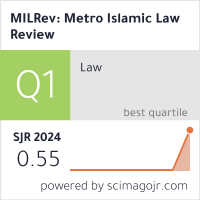Bank Interest in the Contemporary Era: Problem of Ad'afan Muda'afah Interpretation in Determining Law of Usury
DOI:
https://doi.org/10.32332/milrev.v3i1.8948Keywords:
Ad'afan Muda'afah, Bank Interest, Contemporary Era, Persecution, Riba.Abstract
Usury in Islam is a prohibited system in the Qur'an and hadith. The system is not recognized in the modern banking system, leading to different opinions among Muslims in determining the legality of bank interest. Therefore, this research aimed to explore the contemporary law of bank interest, focusing on the different opinions among the mufasir on the definition of Ad'afan Muda'afah as a basis for determining the legality of usury. A normative method was adopted, and a literature review of several scholars was conducted on usury law and the interpretation of Ad'afan Muda'afah. The data was analyzed considering the modern banking system within the framework of Islamic law, particularly Maqashid Shari'ah. The results showed that the difference in the illat used for bank interest law varied in legal conclusions. Despite efforts to forbid bank interest, Muslims did not attain a definite solution to avoid this issue. Consequently, bank interest was temporarily sanctioned under certain conditions such as not being compounded, having low interest, and not comprising any form of persecution. To address this problem, Muslims should support the existence of Islamic bank producing muamalah products according to Islamic Sharia.










